Undergraduate Research Mentor Award

The Undergraduate Research Opportunities Center (UROC) offers the UROC Undergraduate Research Mentor Award to recognize and honor the practice of mentoring undergraduate research and scholarship at California State University, Monterey Bay (CSUMB). This award is intended to recognize demonstrated excellence in supporting undergraduate researchers, to encourage mentoring relationships with undergraduate students, and to convey the campus' high regard for such contributions made by the academic and research community at CSUMB and other regional research institutions.
Both CSUMB and UROC embrace the vision of providing innovative and relevant educational opportunities to our unique population of undergraduate students. The UROC Undergraduate Research Mentor Award recognizes mentors who strive to uphold this vision by enhancing research opportunities for CSUMB’s undergraduate population and cultivating a collaborative, intellectual community.
Mentor of the Year 2023
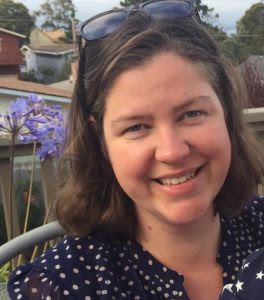 Dr. Alison Haupt
Dr. Alison Haupt

Dr. Alison Haupt is an Associate Professor in the Department of Marine Science at California State University, Monterey Bay. Her research lab focuses on answering applied ecological questions that promote improved marine management and conservation by focusing on species and ecosystems confronting anthropogenic stressors such as urbanization, climate change, and fishing pressure. To address questions of applied ecology, her lab uses and applies a wide variety of tools ranging from population genetics to forensic genetics to ecological modeling to traditional field ecology.
Dr. Haupt is local to the Monterey area and went to Monterey High School. She attended University of California at Santa Barbara where she majored in Biology. She completed her Ph.D. in Biological Sciences at the Hopkins Marine Station of Stanford University. Her thesis focused on using population genetics to contemporary and historical demography of fished marine species. After her Ph.D. Dr. Haupt was awarded a two year Sea Grant policy fellowship through the West Coast Governors Alliance On Ocean Health and spent one year based at the Natural Resources Agency in Sacramento, CA and one year at NOAA’s Northwest Fisheries Science Center in Seattle, WA. As a postdoctoral scholar at the University of Massachusetts Boston she studied east coast kelp forests. Her research program at CSUMB has been supported by the National Science Foundation (NSF), California SeaGrant, and NASA. While at CSUMB, Dr. Haupt has mentored 12 UROC Scholars and 20 UROC Researchers, many of whom have since pursued careers in the sciences, either through graduate programs or jobs. The majority of these students have presented at national conferences, CSU student research competitions, and several have won presentation awards. Two of Dr. Haupt’s UROC scholars have been awarded an NSF GRFP scholarship or honorable mention.
Over the course of her career, Dr. Haupt has done field work across the United States, Mexico, South America, the Caribbean, and the Mediterranean. Being exposed to so many amazing field research opportunities underscored the importance of field and research experiences for students, and motivates her to create as many meaningful and impactful research and field opportunities as she can for CSUMB students. Field experiences are often formative experiences for undergraduates and have been shown to increase retention in the field and narrow demographic achievement gaps (Beltran et al. 2020). However, diverse participation often lags in field courses and field environments can often be toxic for minorities, women, and people with disabilities (MacDonald 2020, O’Brien et al. 2020; Pickrell 2020; Clancy et al. 2014; Simmonds 2014). Dr. Haupt’s field experiences – both good and bad – have driven home the importance of positive first research experiences, especially for students from underrepresented groups in STEM and first-generation college students. Dr. Haupt’s lab has worked to create a safe and inclusive environment by providing students with the equipment, information about what to expect, and the resources they need to succeed in and enjoy field experiences.
2022 - Dr. JP Dundore-Arias
JP Dundore-Arias is a plant pathologist with an interdisciplinary background and broad experience investigating the biology, ecology, and management of plant-associated microbes. He received his B.Sc. in Agronomy from the University of Costa Rica, and worked growing and selling fresh produce at a local Feria del Agricultor (farmer's market), and later, became a food safety consultant to the local coffee industry. He then moved to the US and completed M.S. and Ph.D. degrees in Plant Pathology at Iowa State University and the University of Wisconsin-Madison, respectively. After completing graduate school, he received a National Science Foundation Postdoctoral Fellowship and worked at the University of Minnesota.
Currently, he is an Assistant Professor of Plant Pathology at California State University Monterey Bay, where he leads the new Agricultural Plant and Soil Science major. Ongoing projects in his lab are aimed at investigating the fate of soilborne pathogens in specialty crop production systems, and their control through integrated management approaches, as well as deciphering strategies to manage soil microbiomes and promote pathogen suppression. Additionally, he co-directs the NSF-funded Agricultural Microbiomes Research Coordination Network and is leading efforts to develop metadata standards and ontologies specific to the agricultural microbiomes research community. He is recognized for his personal commitment to promoting equity, diversity, and inclusion in STEM fields, and for his contributions to broadening the participation and retention of diverse students and professionals in plant sciences.
Dundore-Arias’ personal and professional experiences have motivated him to serve as a mentor and role model to his students. He fosters a growth mindset in which students learn to recognize that scientific knowledge and research expertise are not innate and can be developed, with the goal to increase self-confidence, sense of belonging, and science identity. In both the classroom and the laboratory, he mentors students to overcome the prevailing societal taboo against failure, by demonstrating to them that in science, research progress and attainment are achieved through a process of experimentation, failure, and adaptation. As a research mentor, he is committed to providing mentees with customized support according to their individual needs and career goals, offering supported technical and professional training and experiences that equip them with the necessary skills to become leaders in the biological sciences and agricultural industry.
Congratulations to all of this year’s nominees and to Dr. Dundore-Arias for earning this well-deserved award in recognition of the excellent work that he has done mentoring CSUMB students.

2021 - Dr. Cheryl Logan
Dr. Cheryl Logan is an Associate Professor in the Department of Marine Science at California State University, Monterey Bay. Her research group studies the physiological mechanisms that marine animals use to cope in changing environments, from the biochemical to the whole organism level. Their focus is on measuring species’ physiological capacity for acclimation and adaptation to future climate change. This information can then be incorporated into predictive models of how species will respond to rising ocean temperatures, hypoxia and ocean acidification. Understanding the mechanistic basis for why species ranges are shifting is fundamental to predicting which species will be the “winners” and “losers” in the face of climate change.
Dr. Logan was born and raised in Kansas City, MO before moving to the San Francisco Bay Area at age 11. She attended University of California, Berkeley where she majored in Integrative Biology and Molecular & Cell Biology. She completed a PhD in Biological Sciences at the Hopkins Marine Station of Stanford University and a postdoctoral fellowship at Princeton University in Atmospheric and Oceanic Sciences. Logan was a U.S. Department of State Fulbright Scholar to Ecuador in 2019 and recently served on a U.S. National Academy of Sciences committee studying human interventions to increase the resilience of coral reefs. Her research program has been supported by the National Science Foundation (NSF), California SeaGrant, NOAA-Coral Reef Conservation Program, the Coral Reef Alliance, and the National Geographic Society.
Mentoring undergraduate research is one of Logan’s most rewarding activities as a professor. She has served as a faculty mentor to 26 students in the Undergraduate Research Opportunities Center (UROC) programs (16 Scholars and 10 Researchers). Sixteen have gained acceptance into MSc or PhD programs while others have positions in industry or at governmental agencies. Her mentees have received significant recognition for their research, including NSF Graduate Research Fellowships, Sally Cassanova Pre-doctoral Fellowships, and the Goldwater Scholarship. Logan has also mentored more than 60 undergraduates as part of her research-based course in Marine Experimental Physiology where students do hands-on research using RNA sequencing and big data informatics. Dr. Logan is grateful to UROC, and especially to Dr. Bill Head, for pivotal guidance in becoming an effective and compassionate research mentor early in her career. In her free time, Logan enjoys running, yoga, and exploring nature with her husband and two young children.
Congratulations to all of this year’s nominees and to Dr. Logan for earning this well-deserved award in recognition of the excellent work that she has done mentoring CSUMB students. Enjoy this special video message from the Dean of the College of Science, Dr. Andrew Lawson.
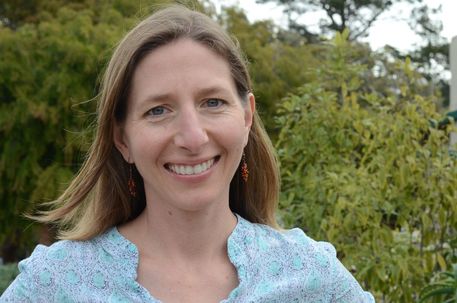
2020 - Dr. Jenny (Meng-Hsien) Lin
Dr. Jenny (Meng-Hsien) Lin is currently an Assistant Professor of Marketing at CSU Monterey Bay. She received her Ph.D. in Marketing from Iowa State University and her MBA and MS in Biomedical Sciences prior to that. She holds a BS in Veterinary Medicine from Taiwan, where is originally from.
Her research focuses on studying individual differences in sensory (olfaction, haptic, visual) perceptions and its impact on consumer decision making and consumer well-being outcomes using a combination of surveys, behavioral experiencs, neuroscience methods and in-depth interviews. Her other research interests involved understanding children's cognitive and emotional processing of online advertising and the influence of social media with the focus of empowering parents (mothers in particular) through understanding their use of social media.
Dr. Lin's work has been published in European Journal of Marketing, Journal of Advertising, Journal of Consumer Affairs, Frontiers in Psychology and other scholarly outlets. Her research has implications for marketers, retailers, advertisers, and public policymakers. Dr. Lin has been awarded the Best Article for Journal of Advertising in 2019, and in the same year, she also received the CSUMB Faculty Discovery and Creation Award.
Dr. Lin has mentored 16 UROC Researchers and Scholars, including students majoring in business or psychology. Four of her past students have been selected as delegates representing CSUMB at the CSU Student Research Competition, in which two teams won first place in the Business, Economics, and Public Policy session. She has co-authored with several of her students resulting in over 10 peer-reviewed articles and can be seen in conference papers, book chapters and case studies. In her free time, she enjoys spending time with her 3-year-old son and 14-year-old cat. She also enjoys traveling the world and her son has followed her on many of her adventures.
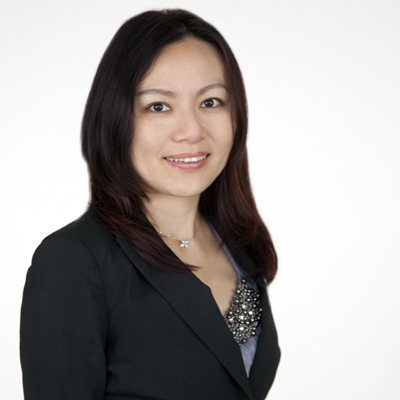
2019 - Dr. Kelly Medina-Lopez
Dr. Kelly Medina-Lopez, Assistant Professor of Composition Studies in the School of Humanities and Communication, has an MA in Spanish with an emphasis in Chicanx Studies and a PhD in Rhetoric and Professional Communication with an emphasis in Cultural Rhetorics and Composition Studies, both from New Mexico State University.
Her research interests include decolonial research methods, critical making and multimodal composition pedagogy, chicanx/latinx rethorics, borders studies, language politics, and antiracist assessment/assessment for social justice. You can find her writing in Constellations: A Cultural Rhetorics Publishing Space, the edited collection Querencia: Essays on the New Mexico Homeland, and a forthcoming journal, Latinc Rhetoric and Writing Studies.
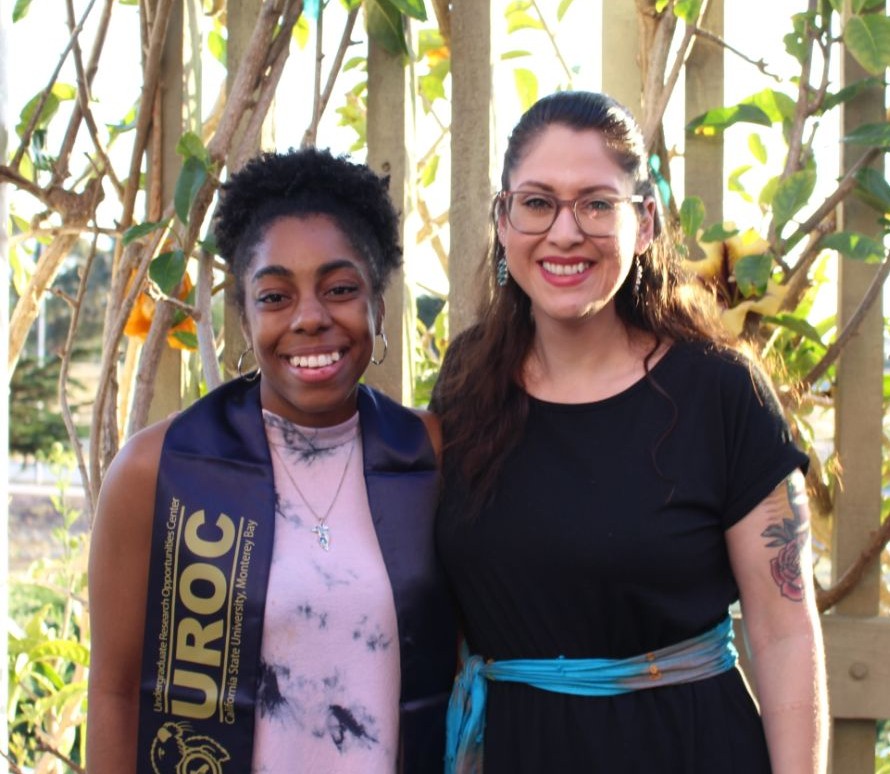 Giana Hamilton, UROC Researcher, with Dr. Kelly Medina-Lopez at the 2019 Year End Celebration
Giana Hamilton, UROC Researcher, with Dr. Kelly Medina-Lopez at the 2019 Year End CelebrationThe student work she mentors through UROC includes projects that explore embodiment in the Salvadorean myth of La Sihuanaba, decolonial archives and the Latina Task Force, "Quilting Composition," a multimodal rasquache maker project that uses quilting to help students better understand writing, indigenous Guatemalan Maya huipiles as testimonio, free speech, and social justice, and contemporary Chicanx teatro and arte. She has presented with her mentees at the Cultural Rhetorics Conference, the Hawaii International Conference on Arts and Humanities, the Conference on College Composition and Communication, and the National Association for Chicana and Chicano Studies.
In summer 2019, Kelly and Dr. Shantel Martinez from the Otter Cross Cultural Center partnered with UROC to co-lead an intensive summer research experience that immerses students in border theory and humanities and communication research methodologies. The experience included a 10-day trip to the US/Mexico border in El Paso, Texas where students will conduct humanities-based research projects related to contemporary migration issues and politics.. In her spare time, Kelly enjoys traveling, cooking, homebrewing beer, and watching unreasonable amounts of Netflix with her partner and two doggos.
2018 - Dr. Danielle Burchett
Dr. Danielle Burchett joined the CSUMB Department of Psychology in 2014. In addition to teaching undergraduate courses on psychopathology and career planning for psychology majors, Dr. Burchett works closely with undergraduate researchers as director of the Clinical and Forensic Evaluation (CAFE) Laboratory. CAFE Lab research examines strengths and weaknesses of clinical psychological tests -- especially when they are used to understand forensic inpatient symptom severity and reporting accuracy.
CAFE Lab graduates have gone on to Master's and Doctoral programs in clinical psychology, counseling psychology, social work, health psychology, experimental psychology, and human factors and ergonomics.
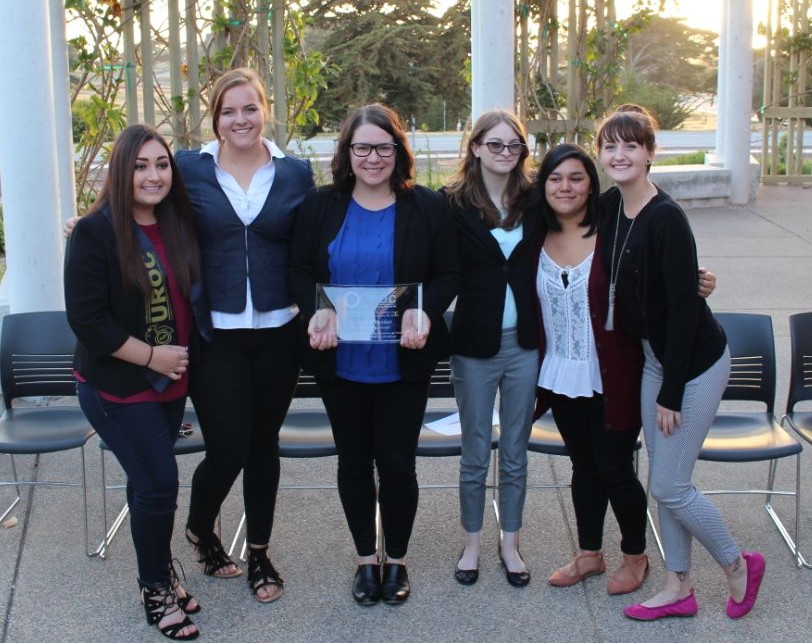 Dr. Danielle Burchett (3rd from the right) with students from the CAFE Lab
Dr. Danielle Burchett (3rd from the right) with students from the CAFE LabDr. Burchett promotes scientific rigor and ethics as Consulting Editor of four scholarly journals, by serving on the CSUMB Committee for the Protection of Human Subjects, and as a science fair judge at a local junior high school.
Dr. Burchett recognizes the inspirational mentors who inspired her interest in psychology, love of psychological testing, and who provided significant professional development support as she transitioned from student to professional. Most importantly, she credits her mom, Charlotte Horton, for her unwavering confidence in Dr. Burchett's ability to accomplish her goals.
2017 - Dr. John Goeltz
Dr. John Goeltz teaches general and upper-division chemistry, develops lower-division chemistry lectures and labs in collaboration with department faculty, and mentors undergraduates researching applied electrochemistry and the physical chemistry of water. After studying inter- and intra- molecular electron transfer in his graduate research, Dr. Goeltz joined Sun Catalytix Corporation, developing new chemistries for grid scale energy storage, work that continues at Lockheed Martin Advanced Energy Storage.
Dr. Goeltz counts among his chemistry mentors, his Ph.D. advisor Cliff Kubiak of UC San Diego; his undergraduate advisor J. Michael McBride of Yale; Ann Valentine of Temple, K. Travis Holman of Georgetown; Jane Frommer of IBM; Randy Duran of Louisiana State; and Sharon Anderson of CSUMB.
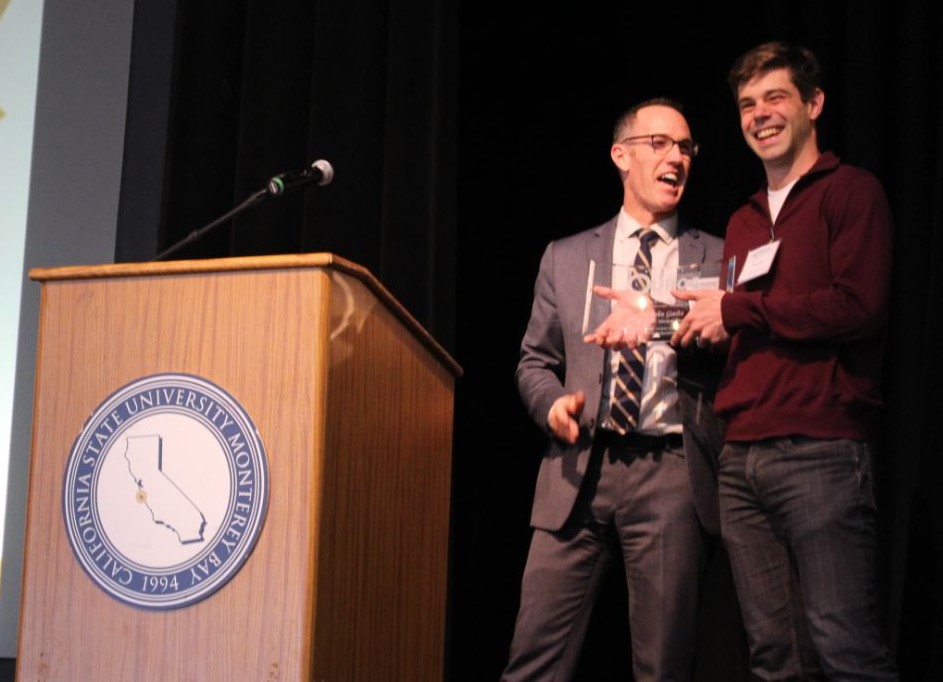 Andrew Lawson, Dean, (left) presents Dr. John Goeltz with the Mentor of the Year Award
Andrew Lawson, Dean, (left) presents Dr. John Goeltz with the Mentor of the Year AwardDr. Goeltz has authored thirteen peer-reviewed publications, is listed as an inventor of four granted patents, and has more than fifteen pending patent applications. He especially proud that one recently submitted patent application includes a current mentee as a co-inventor. Dr. Goetlz mentors fourteen CSUMB undergraduate students in various capacities and is proud to see several of them graduate this semester.
He practices Ashtanga yoga and brews ales whenever possible. His efforts in breathing, brewing, and battery research are supported strongly by his wife Garren and his daughter Sasha, 3.
2016 - Dr. Arlena Haffa
Dr. Arlene Haffa has been a member of the CSUMB faculty for 5 years and in this time has served not only as a mentor to 7 UROC Scholars, 13 UROC-funded researchers, but as also provided research opportunities through other funding sources (e.g. CSUPERB, USDA, WRPI), and in course-based research to over 4 dozen other students. This has resulted in one-peer reviewed publication, 57 student capstones (15 individual and 10 groups), 10 admissions to graduate programs, scholarships, and positions at numerous places such as the USDA, biotech companies, and a winery.
Her enthusiasm for research is broad and she works hard to find opportunities that best suit the interests of her students.
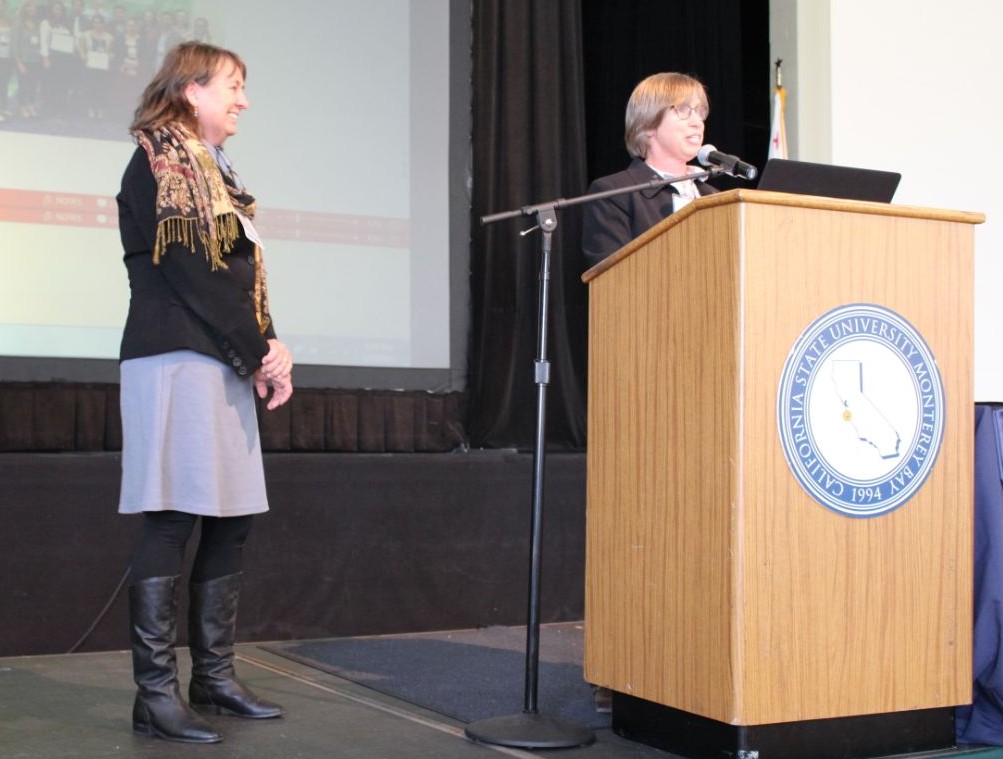 Sharon Anderson, Dean, (right) presents the Mentor of the Year Award to Dr. Arlene Haffa
Sharon Anderson, Dean, (right) presents the Mentor of the Year Award to Dr. Arlene HaffaDr. Haffa grew up in rural Northwestern Wisconsin and spent much of her time outdoors with her 4 brothers exploring the world. She learned the avlue of undergraduate research at the University of Wisconsin where she authored her first publication on lipoprotein turnover in canines. After working as an analytical chemist in an EPA lab for a year, she returned to UW-Madison to do cancer and obesity research while earning a Masters in Veterinary Science. For several years she performed research at the UW Medical School and Primate Research Center on Immunology and Osteoporosis. After moving to Arizona, Dr. Haffa then attended Arizona State University and Cellular Biology in the Department of Chemistry and Biochemistry.
Her currently funded research is to study the nitrogen cycle in agriculture and to help develop best management practices that concurrently reduce greenhouse gases emissions in the form of nitrous oxide, and nitrate leeching into groundwater. She also has a USDA grant that provides research opportunities to over a dozen in agriculturally-relevant positions for 3 years, and is working to develop supplemental instruction materials to support lower division student success.
2015 - Dr. Sam Robinson
Dr. Sam Robinson has served as a UROC mentor to two Humanities and Communication students: Alexis Ingram, Literary and Film Studies, and Elizabeth Hensley, Journalism and Media Studies and Creative Writing.
She grew up on a small farm in Southeast Kansas, and owned two small newspapers in her hometown area for several years. This led to her interest in media coverage and representation in agriculture.
Shortly after arriving at CSUMBin 2013, Dr. Robinson attended the Council of Undergraduate Research Creative Inquiry in the Arts and Humanities Institute at Sacramento State, which explored ways to expand undergraduate research in these areas. She has been involved with UROC ever since as an advocate supporting undergraduate research in the humanities as well as serving in key roles on several UROC committees.
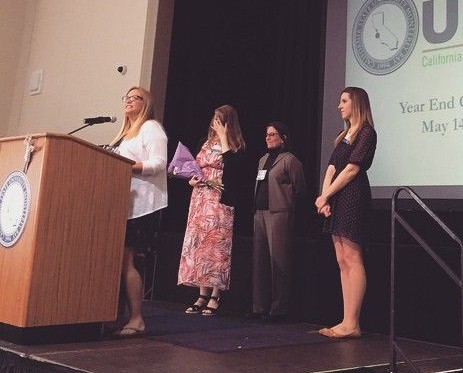 Dr. Sam Robinson addressing the audience at the Year End Celebration.
Dr. Sam Robinson addressing the audience at the Year End Celebration.In 2014, Dr. Robison conducted a study examining agriculture news reporting in California newspapers. The study funded through a CSUMB Faculty Incentive Grant, which allowed three undergraduate student researchers to work with her on the project. She is currently working with UROC staff to develop a STEM written communication course focused on professional writing for a broad audience.
She has two children: Jack, 18 and Kyle, 16.
2014 - Dr. Dave Ebert
We proudly honor Dr. David Ebert with the 2014 UROC Mentor Award.
Dr. Ebert's enthusiasm, curiosity, and earnestness promote close ties with his graduate and undergraduate students. This mentoring culture mixes challenge and excitement, and attracts CSUMB students to join the ranks of his "shark army."
Dr. Ebert gets to know his mentees personally, and he creates research opportunities that maximize their individual learning and career growth. He encourages them to explore multiple projects to broadly understand the research process. Then, with an eye towards their future, he helps them craft research projects aimed to produce capstone projects, conference presentations, peer-reviewed publications, and Master's theses.
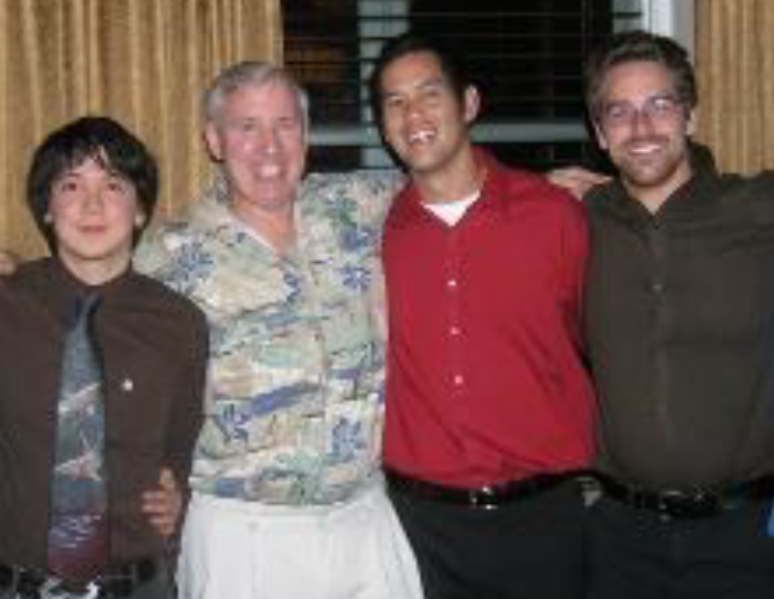 Dr. David Ebert (second from the left) with student mentees.
Dr. David Ebert (second from the left) with student mentees.Dr. Ebert also provides extraordinary opportunities for professional development. For example, he took four UROC students to the American Elasmobranch Society meeting in Albuquerque, New Mexico. The students described the networking opportunities Dr. Ebert created as the highlight of their undergraduate careers. Dr. Ebert also invited three UROC students to present at the International Union for Conservation of Nature Northeast Regional Shark Specialist Group workshop. This meeting is typically attended only by researchers and conservation professionals, giving our students an unprecedented opportunity to showcase their research.
Dr. Ebert is the Pacific Shark Research Center (PSRC) Director at Moss Landing Marine Labs. We deeply appreciate Dr. Ebert's dedication to our UROC students.
2013 - Dr. Aparna Sreenivasan
It is with great honor that we present the 2013 UROC Mentor Award to Dr. Aparna Sreenivasan.
Dr. Sreenivasan is profoundly committed to student development and achievement. This is evident in the classroom and in her research lab. Her courses are innovative, hands-on, and rigorous. Her curriculum engages students and challenges them to excel, while providing the support they need to be successful.
Dr. Sreenivasan cultivates a lab culture that encourages independence, interdependence, cross-cohort mentoring, and high achievement. She has shaped her research agenda and created top tier research partnerships to engage students of all levels in projects that develop intellectual acumen and high-demand skill sets for the workforce and graduate school.
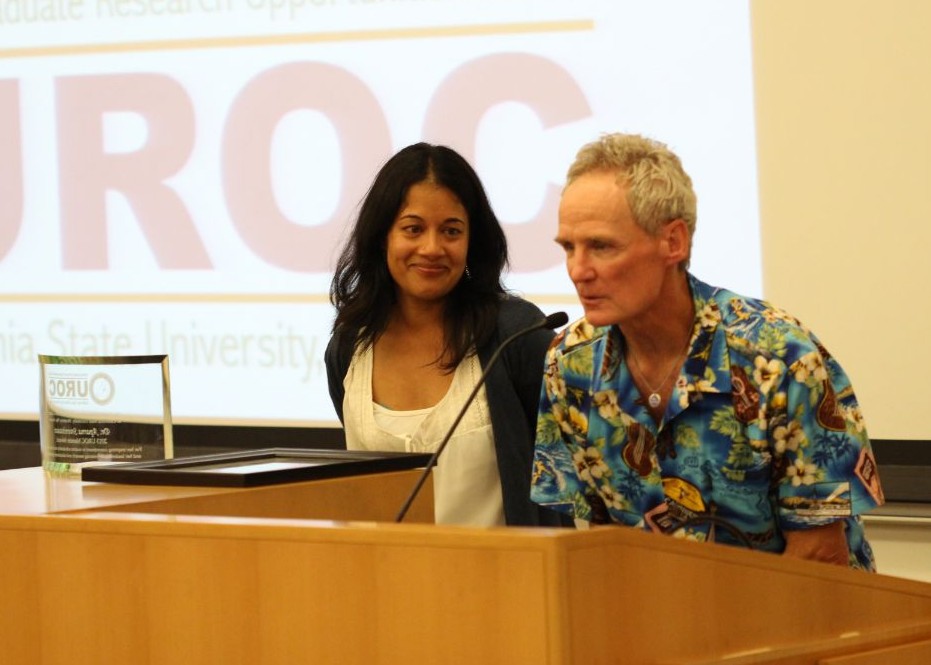 William Head, UROC Director, (right) presents Dr. Aparna Sreenivasan with UROC Mentor Award.
William Head, UROC Director, (right) presents Dr. Aparna Sreenivasan with UROC Mentor Award.These features, combined with Dr. Screenivasan's powerful and inspiring mentoring, lead to incredible student success. Five of her recent mentees, including two recipients of the National Science Foundation's Graduate Research Fellowship, are now in prestigious Ph.D. programs.
We deeply thank Dr. Screenivasan for her commitment to student scholarship and success, and we are privileged to have her our UROC family.
2012 - Dr. Carolee Bull
Dr. Carolee Bull is the Acting Assistant Area Director for the Pacific West Area, United States Department of Agriculture and Research Plant Pathologist, USDA Agricultural Research Service, Salinas.
Dr. Carolee Bull views mentorship as a two-way relationship based on candor, challenge, support, and growth. Candor to identify one's strengths and weaknesses; challenge to empower students to develop their scholarly identity; support to cultivate student success; and growth that comes from providing and accepting mentorship. As Dr. Bull states, "That might be what makes a good mentor --- someone who is willing to be mentored.
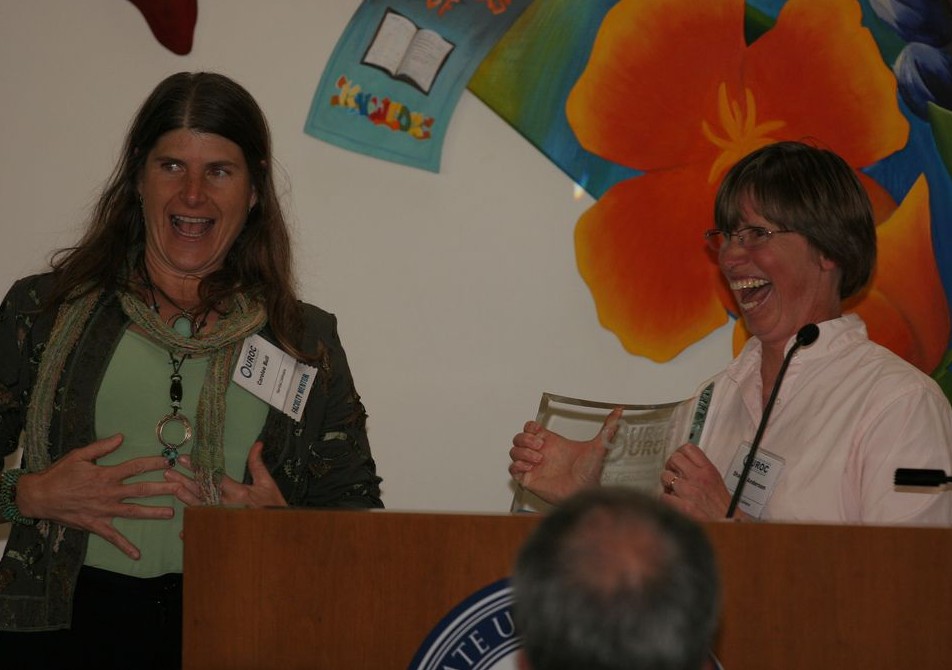 Sharon Anderson, Dean, presents Dr. Carolee Bull (left) with the Mentor of the Year Award.
Sharon Anderson, Dean, presents Dr. Carolee Bull (left) with the Mentor of the Year Award.This mentoring philosophy translates to authentic and accomplished mentee relationships with students from CSUMB and other educational institutions, such as Hartnell College and regional high schools. Many of her mentees are now pursuing Ph.D. degrees, and two of them, including CSUMB's Isael Rubio, were awarded the prestigious National Science Foundation Graduate Research Fellowship. Isael says of Dr. Bull's mentorship, "My experience with Carolee was invaluable. Working with her has brought out the true scientist in me, and has allowed me to discover my dormant abilities and future aspirations."
Dr. Bull serves on UROC's Advisory Committee, is active in UROC's Mentor Training workshops, and is the regional with the USDA, Agricultural Research Service (ARS), where she helps place students with her fellow ARS researchers. Dr. Bull assesses student's knowledge, skills, and abilities and matches their talents and learning needs to mission-driven research experiences at the ARS. Working alongside ARS researchers, students not only expand their research skills, they directly contribute to USDA's national research priorities.
Dr. Bull's commitment to growing researchers goes beyond individual students. She has a vision that the Salinas Valley will be as well known "for growing scientists as it is for growing vegetables." We have no doubt that with her passion and commitment this vision will be realized. It with great honor that we present Dr. Carolee Bull with UROC's inaugural Mentor Award.
Students, faculty, and staff are welcome to nominate any eligible mentor to be considered for this award. UROC staff will not be eligible to submit nominations.
This award is available to all mentor to current UROC Scholars, Researchers, and UROC Certificate Program participants at CSUMB and other regional research institutions. Recipients may include any and all faculty, staff, post-docs, and graduate students who serve as mentors to UROC students.
Past awardees are not eligible for a period of five years following receipt of the award (eligible again in the 6th year after receiving the award).
Nominations will be evaluated by the UROC Advisory Board, which is composed of faculty across colleges/disciplines.
This award is granted to individuals who mentor UROC undergraduates outside of the classroom, and who are committed to undergraduate research, which extends above and beyond a course experience. The selection committee defines mentored research as mentors advising and working one-on-one with UROC students on personalized, creative, enriching projects.
Specific evaluation criteria may include:
- Degree of commitment of UROC's mission of promoting scholarly identity, intellectual vibrancy, and the development of social capital by mentoring undergraduate students through research, scholarship, and creative activities.
- Sustained commitment to mentoring undergraduate researchers in general, and UROC students in particular over time.
- The strongest nominations will demonstrate a commitment to undergraduate research through specific examples, including peer-reviewed publications involving undergraduates, undergraduate research presentations, awards, or scholarships, and evidence for the continuing success of mentored students in the research endeavor. Information on where former mentees are now is also welcome.